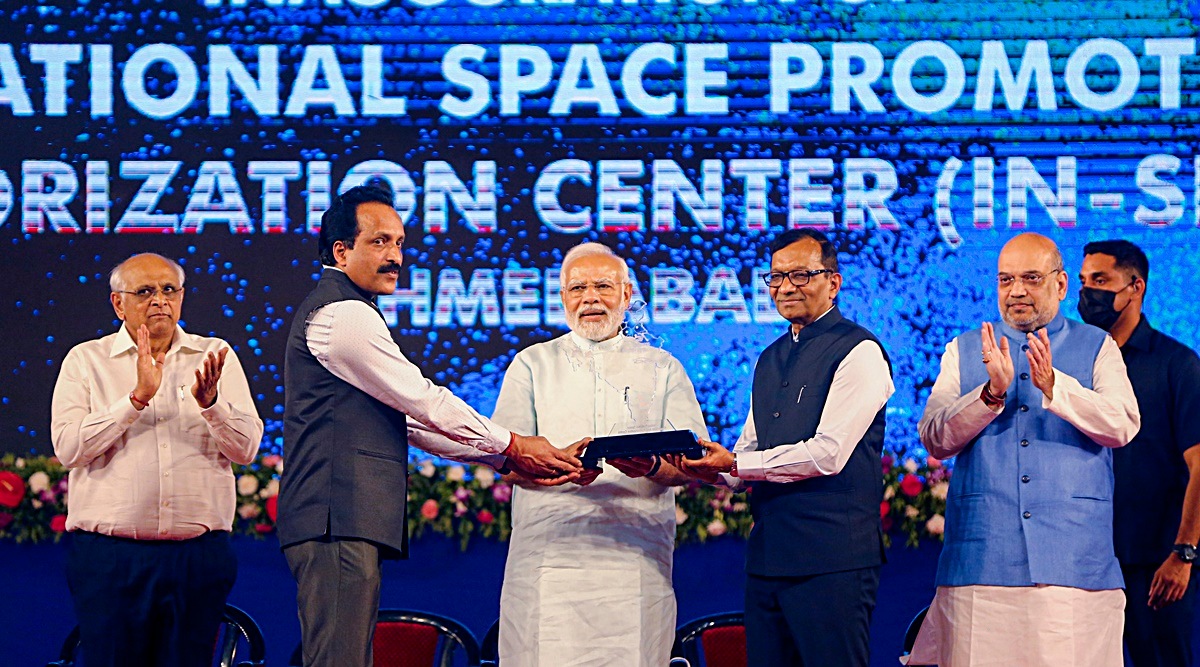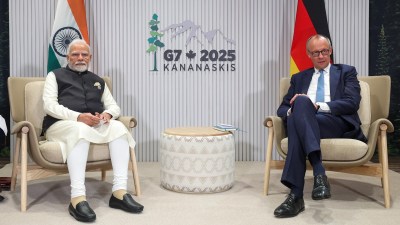Stay updated with the latest - Click here to follow us on Instagram
IN-SPACe: Role, mandate and the way forward
In a media interaction Friday, Goenka said some of the issues on the expected agenda for the board meeting will include “the board defining powers of the chairman" who, in turn, "will define the powers of the director”.
 Prime Minister Narendra Modi receives a memento from IN-SPACe Chairman Pawan Kumar Goenka(R) during the inauguration of the headquarters of Indian National Space Promotion and Authorisation Centre (IN-SPACe), in Ahmedabad, Friday, June 10, 2022. Union Home Minister Amit Shah and Gujarat CM Bhupendra Patel are also seen. (PTI Photo)
Prime Minister Narendra Modi receives a memento from IN-SPACe Chairman Pawan Kumar Goenka(R) during the inauguration of the headquarters of Indian National Space Promotion and Authorisation Centre (IN-SPACe), in Ahmedabad, Friday, June 10, 2022. Union Home Minister Amit Shah and Gujarat CM Bhupendra Patel are also seen. (PTI Photo)The Indian Space Promotion and Authorization Centre (IN-SPACe) is expected to hold its second board meeting Saturday—the first at the newly inaugurated headquarters in Ahmedabad, said IN-SPACe Chairperson Pawan Goenka. This comes even as a new Indian space policy is expected as soon as within a month.
In a media interaction Friday, Goenka said some of the issues on the expected agenda for the board meeting will include “the board defining powers of the chairman” who, in turn, “will define the powers of the director”. Further, five proposals will be put up before the board for authorisation to start the work from the 10 MoUs that were exchanged Friday with IN-SPACe at the inaugural ceremony.
“As of now, we cannot sign authorisation without board approval but the board may decide that for certain kinds of things the chairman can take decisions,” said Goenka.
There are 12 board members including Goenka, along with UGC chairman Prof M Jagadesh Kumar, Sandhya Sharma IAS, former secretary of earth sciences Shailesh Nayak and Bhaskaracharya Institute for Space Applications and Geoinformatics (BISAG) director Tej Pal Singh, among others.
Clarifying that ISRO, NewSpace India Ltd (NSIL) and IN-SPACe will play “very different” roles, Goenka explained that NSIL, a public sector enterprise, will be the “commercial arm of the government in space, with the role to commercialise what ISRO does.” “So basically, NSIL will not get involved from agency to agency but let’s say (if) the private sector wants to use ISRO launchpad or ISRO rocket for a launch, they will go to NSIL to do this as it’s a commercial agreement. There can be a country-to-country deal with NSIL. ISRO, when it was conceived originally, was not meant to do anything with the private sector. Now when we are trying to see how ISRO’s facilities, technology and infrastructure can be used by the private sector, NSIL plays that role,” said Goenka.
On the other hand, the private sector should aproach IN-SPACe for all their needs. “So if they need to use any facility from ISRO, they will come to IN-SPACe. If they want any technology, they will come to IN-SPACe. IN-SPACe will work with ISRO and NSIL to transfer that technology through NSIL to the private sector. So, basically IN-SPACe is creating a single window for the private sector to approach the government for any space-related activity. Actual execution can be done by ISRO, NSIL and over time, maybe even by IN-SPACe,” Goenka explained. IN-SPACe will also work to connect the private sector globally to take their technology and infrastructure to get business from outside.
However, attracting business interest of other nations would not only involve technical and commercial capacities, but will also involve a “diplomatic angle” requiring involvement of embassies and high commissions, added Goenka.
“…it is not just driven by cost, there are many other angles involved, including security and political relationships. So identifying countries (of opportunities) is something that will have to be worked out with the Ministry of External Affairs but we are looking at countries that don’t have their own space infrastructure but require space outcomes. There is no country in the world today that does not require space-based data,” added Goenka.
Meanwhile, Goenka said the new space policy, expected to be out in a month’s time, “will address everything”. “Currently, the space policy is of 1997 and another policy for remote-sensing, which is very old. At that time, there was no thought of private players being in space. The new policy has been written with the primary objective to enable private players to be in this sector …”






